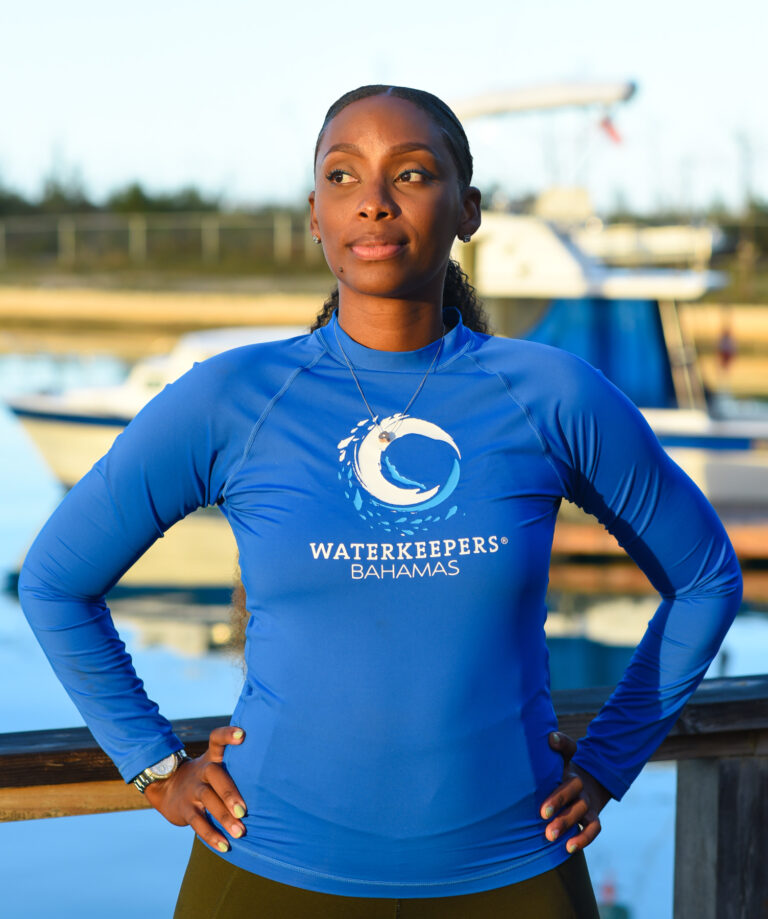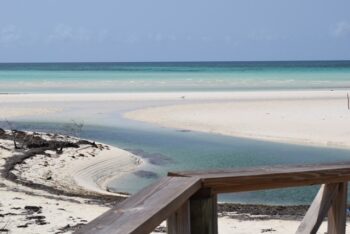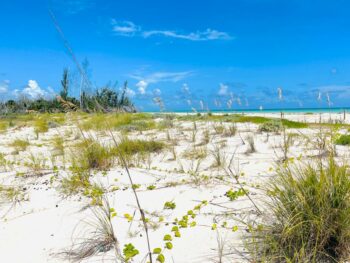Who Is Waterkeeper: Rashema Ingraham, Bimini Coastal Waterkeeper
By: Thomas Hynes

Bimini is the westernmost region of The Bahamas. This chain of small islands is only about 50 miles west of Miami and is home to the famed Bimini Road, an underwater formation of rocks resembling a road or wall with legendary ties to the Fountain of Youth and the lost city of Atlantis. Today, the islands are at risk of becoming legends too, with the threats of climate change, hurricanes, and massive coastal erosion bearing down on them.
The island is also the birthplace of Rashema Ingraham’s mother and where she spent many school vacation days with her paternal grandfather. Rashema saw a need for somebody to step forward and begin to speak on behalf of the public, while also educating the public as to the power that they hold. So in 2014, she became Bimini Coastal Waterkeeper to better protect and advocate for the home waters of her family.
Rashema is also the executive director of Waterkeepers Bahamas, a regional entity that includes two other Waterkeeper groups. Though Rashema hopes to see that number grow.
“We have 700 islands, keys, and rocks here, but I’m not sure we’ll get 700 Waterkeepers. Though it’s possible because there is so much water,” says Rashema. “I’d like to see the day when Waterkeepers Bahamas has 20 really passionate, focused Waterkeepers.”

There would certainly be enough work to keep those Waterkeepers busy. The biggest threats are the intensified storms made worse by climate change and the attendant sea level rise that is particularly dangerous to these low-lying Bahamian islands. It can affect the amount of freshwater that we have on the island because the salt water now floods further inland than it did previously. The water is being retained inland longer during storm surges, which affects drainage and the overall health of the mangroves and pine forests ecosystems. It can also damage utilities and lead to power outages. Rashema even lost power momentarily while speaking on the phone for this story. In 2019, Hurricane Dorian ushered in a terrifying new paradigm of much stronger storms.
“When the storm came, never did we expect to see so much water come inland. We are always prepared for hurricanes, especially for strong winds. We batten up our houses. But these hurricanes have really changed their dynamics,” says Rashema. “Homes and residences and places you would never expect to see storm water had 17 feet of surge. We need to now pay more attention to water as it applies to sanitation and health and access to drinking water. After Hurricane Dorian we went for months without being able to access our own household water supply from the utility company.”
To take on the encroaching threat of sea level rise, Rashema and Waterkeepers Bahamas are betting big on a natural solution: the mangrove tree. Mangrove trees can tolerate both freshwater and saltwater and provide a great buffer for storm surges. They also sequester carbon and act as ideal nurseries for all kinds of fish, birds and other marine life. They are also great for humans in that they filter the water and release oxygen.
For all these reasons, Rashema has undertaken a major endeavor to reintroduce mangrove growth to the Bahamas. Beginning in 2020, Rashema set an ambitious goal of growing 30,000 trees. In the end, she surpassed that goal and grew 33,000 mangroves, all of which will be planted in local waters for the betterment of the Bahamas.
Another threat looming over the Bahamas – and, well, everywhere else in the world too for that matter – is the dirty and very dangerous fossil fuel industry. The Bahamas are particularly vulnerable to oil spills though Rashema is not just standing by waiting for disaster to strike. In 2020, she co founded The Our Islands Our Future coalition, which researched Bahamian law, international agreements, recent policy announcements and global trends toward oil drilling policy and proposed a pathway for establishing a permanent ban on oil drilling in The Bahamas.
Rashema is using this information to help her fellow Waterkeeper groups in Senegal stop destructive drilling projects there. Sharing best practices and insights is strengthening the Waterkeeper Alliance network which has already done a lot for her.
“Waterkeeper Alliance has provided a resource center for how to get a monitoring lab established, to know best practice, create and finalize standard operating procedures for bacteria monitoring, even the type of equipment to use, and where to buy it,” says Rashema. “Having a sounding board, almost like a mentoring system within itself, bringing together many voices to discuss what brings us together, issues that connect us to each other, has been helpful, beneficial, and needed.”
When she’s not growing mangroves or working with her Waterkeeper colleagues, Rashema also runs youth programs for local high school students. There is also a citizen science initiative, and works with other civic organizations to conduct water sampling. It’s all part of an effort to get people out on the water as much as possible.

“The water is crystal clear and it allows you to see everything, whether you’re in the water, gliding on a boat, or standing on the shore. We summarize the Bahamas as sun, sand, and sea. But there is so much more than that. It is also the perfect temperature to explore more outside, to kayak through the mangroves, to snorkel through the coral reefs, to dive and find wrecked sites, to be up close and personal with so many creatures that make up vibrant ecosystems,” says Rashema. “Knowing that all this richness exists and abundance of life present is what got me involved, it is why I became an advocate.”
Click here to make a donation and support the important work of Waterkeepers Bahamas.